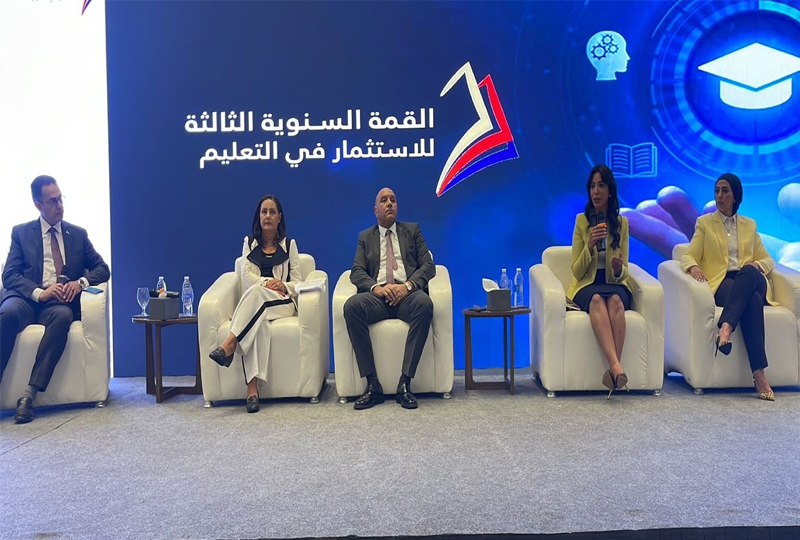The United Bank supports the educational system with investments exceeding billion L.E.
09/07/2024

In the 3rd annual summit for investment in education
Nevine Kashmiry: Deputy Managing Director for Business Sector
The United Bank investment the Egyptian educational system development exceed one billion L.E.
· Investing in education is a strategic vision for banks amid the New State.
· 7 motivational ways for private sector and public sector to finance education.
· 6 social and economic advantages for make long- term investments in education.
· The policy of the state and The Central Bank of Egypt aim to deepen the Egyptian identity and build an educated innovative generation.
· 5 educational challenges require flexible banking strategies.
Cairo: 9th of July, 2024
Nevine Kashmiry- Deputy Managing Director for Business sector participated in the 3rd annual summit for investment in education, under the name of “Investment in education incentives amid the inflation and interest”. Along with the presence of constellation of businesspersons, economists and expertise in education and media persons.
The third annual summit shed the light on investment opportunities and the most attractive sector for investors. Coming on top the educational sector as a top priority for the Egyptian government, through the investment integration with the private sector.
In the second session about the interest and financing schooling fees, Nevine Kashmiry highlighted The United Bank innovative investment strategy in developing and qualifying the educational system. The panel was moderated by: Ahmed Diab- Member of BOD and Managing Director for banking operation investment, Ostoul for financial investments. Participated in the session were: Walid Hasona- Executive president of Value, Ahmed Yehia- Head of Corporate sector in National Bank of Egypt, Ebtesam Mahmoud- Head of Investment Sector in Misr for Life insurances, Dr. Haidy El Masry- General Manager of Human Resources and Organizational Development Department in Contact Financial Holding.
In her speech, Kashmiry pointed out that The United Bank strategy comes from a national strategy for human rights 2021 launched by Mr. President Abdel Fattah El Sisi, and as per The Central Bank of Egypt approaches to pay attention to the educational system. Followed by the launch of the State Ownership Policy Document in the educational field. This document includes developing and maximizing investment, whether governmental or private sector, in all educational stages: obligatory education and Pre University, commercial education, industrial education, agricultural education, technical education schools, applied technology schools, and dual education system.
She added that the Egyptian state’s investment in education, higher education and academic research have reached 71 billion L.E. as per the social and economic development plan for financial year 2024-2025. As well as, an increase in the investments funded from the Public Treasury with more than 60% for Education and Technical Education Ministry.
Kashmiry pointed out to the 7 ways to motivate both public and private sector to invest in education field, the thing that will contribute in improving the quality of education and make it more sustainable:
1- Partnerships among private and public sectors: to provide educational services as establishing schools, equipping schools with modern technology, and operating them.
2- Co- investment: financing educational projects in return for long- term contracts.
3- Developing educational curriculum: to meet market demands.
4- Providing awards and scholarships: for distinctive students.
5- Encouraging innovation and technology: to contribute in developing the educational curriculum to meet market demand.
6- Vocational and practical training: through apprenticeship programs for the students, which will help them while acquiring the suitable practical skills needed in the market.
7- Tax incentives: in order to encourage more companies to invest in this sector.
She added that the banking sector led by The Central Bank of Egypt play a pivotal role in developing and improving the educational system. Aiming to deepen the Egyptian identity and build a new innovative and well-educated generation according to the latest international educational system. A generation that is capable of facing the future and leading it with its challenges and opportunities. In order to prosper our nation and accomplish integrated sustainable development. Moreover, supporting the scientific research system, and innovators in different fields.
That is through: educational finance programs, facilitated finance, scholarships, financing programs that meet different needs, innovating saving accounts assigned for education, partnerships with educational institutions, providing consultation services, financing infrastructure projects, innovating educational security products, banking and non- banking solutions to finance institutions.
Nevine Kashmiry stated that there are 5 challenges facing the banking sector amid the economic crisis:
1- Economic turbulence.
2- Increase of default risk.
3- Decrease in applying for educational finance.
4- Lack of investment.
5- The cost of developing the infrastructure to meet the technological development.
She stated that there are 6 social and economic privileges for investing in education:
1- Education is investing in the future: education is a long- term investment. As it increases the capabilities of individuals and enhance their opportunities to get better jobs. Which will lead to improving the financial abilities of individuals in the future.
2- Education works for developing human resources: supporting education contributes to developing the qualified human resources needed in the market, which enhances the national economy.
3- Education contributes to accomplishing social stability: education contributes in decreasing poverty, and increasing social stability. Which will enhance the political and economic environment of banks.
4- Education contributes in raising sustainable development rates: education is a fundamental part of the sustainable development goals, which seek improving the life style and enhancing integrated economic growth.
5- Education achieves return on investments: banks make profits from the interest of educational loans, which is recognized as an additional income for banks.
6- Education contributes to deepening fundamentals of social responsibility: many banks seek to improve its public image and maintain social responsibility through supporting development and education projects.
End.


